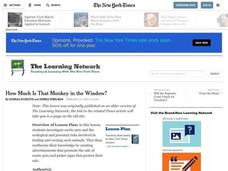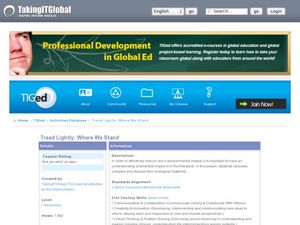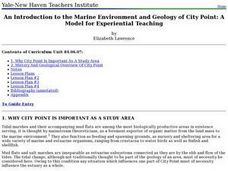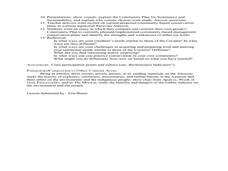Curated OER
Coastal Ecology of the Bahamas
Sixth graders investigate the Bahamas through presentations and charts. In this ecology lesson, 6th graders utilize their library and Internet to research the life forms and species that inhabit the Bahamas. Students observe a...
Curated OER
Interpreting the History, Geology, and Ecology of Monterey Bay
Students explore what they know about Monterey Bay in the special topics course and share their information with K-12 grade children at local schools by participating in the Virtual Canyon Project. Students in this service learning...
Curated OER
How Much is That Monkey in the Window?
Students investigate exotic pets and the ecological and personal risks involved in trading and owning such animals. They synthesize their knowledge by creating advertisements that promote the sale of exotic pets and picket signs that...
Curated OER
Ecology
Young scholars learn what the Kyoto Protocol is and examine the decision of the United States to not sign the agreement.
Curated OER
Tread Lightly: Where We Stand
Students explore the concept of ecological footprints. In this environmental stewardship lesson, students calculate their ecological footprints and consider how to reduce them.
Curated OER
Urban Ecosystems 2: Why are There Cities? A Historical Perspective
Second in a series of five lessons, this lesson encourages preteens to consider cities as urban ecosystems. First, they keep a food diary for a few days. They visit the Natrional Agricultural Statistics Service website for current data...
Curated OER
Consider the Issues
High schoolers develop and express opinions on personal and societal issues in biology through journal entries (written and other forms), oral position statements and group discussions.
Curated OER
Culture, Crisis and Population Explosion: A Deweyan Approach in the Classroom
Students read various arguments posed by John Dewey when it comes to population growth. In groups, they use magazine articles and the internet to find issues related to populations and complete experiments to identify the challenges...
Curated OER
An Introduction to the Marine Environment and Geology of City Point: A Model for Experiential Teaching
Students begin the lesson by researching the history of City Point, Connecticut. Using a map, they color areas they were asked to find and discuss why the areas are important to the community. As a class, they are shown recent slides...
Curated OER
Supermarkets, Sustenance and Sustainability
Students investigate jungles and the people who depend upon them. In this sustainability lesson plan, students research wild life conservation and discover the importance of a jungle to Amazonian people. Students create a group...
Curated OER
Why Do Geese Fly South For the Winter?
Fifth graders examine migration by tracing animal migration routes on a map. In this animal life instructional activity, 5th graders observe a map of North America and read about the migration patterns of geese. Students trace the path...
Curated OER
The Arctic and Taiga Ecozone of Canada
Students discover the differences in the Arctic and Taiga regions of Canada. They identify physical and human characteristics of both region. They also practice using an atlas.
Curated OER
The Arctic and Taiga Ecozone of Canada
Students examine the various sub-regions of the Arctic and Taiga zones in Canada. Using the online Canadian Atlas, they locate and describe the characteristics of each zone. They organize their information into a chart and share it with...
Curated OER
My Time - Lesson Plan
Students discuss time, organize events like geologists do, become familiar with format of time scale used to organize information about Earth history, create list of 20 major events in their lifetimes, and add information about exactly...















